Top 5 Agile Certifications for Beginners
Explore five essential Agile certifications for beginners, each offering unique benefits and paths to enhance your project management career.
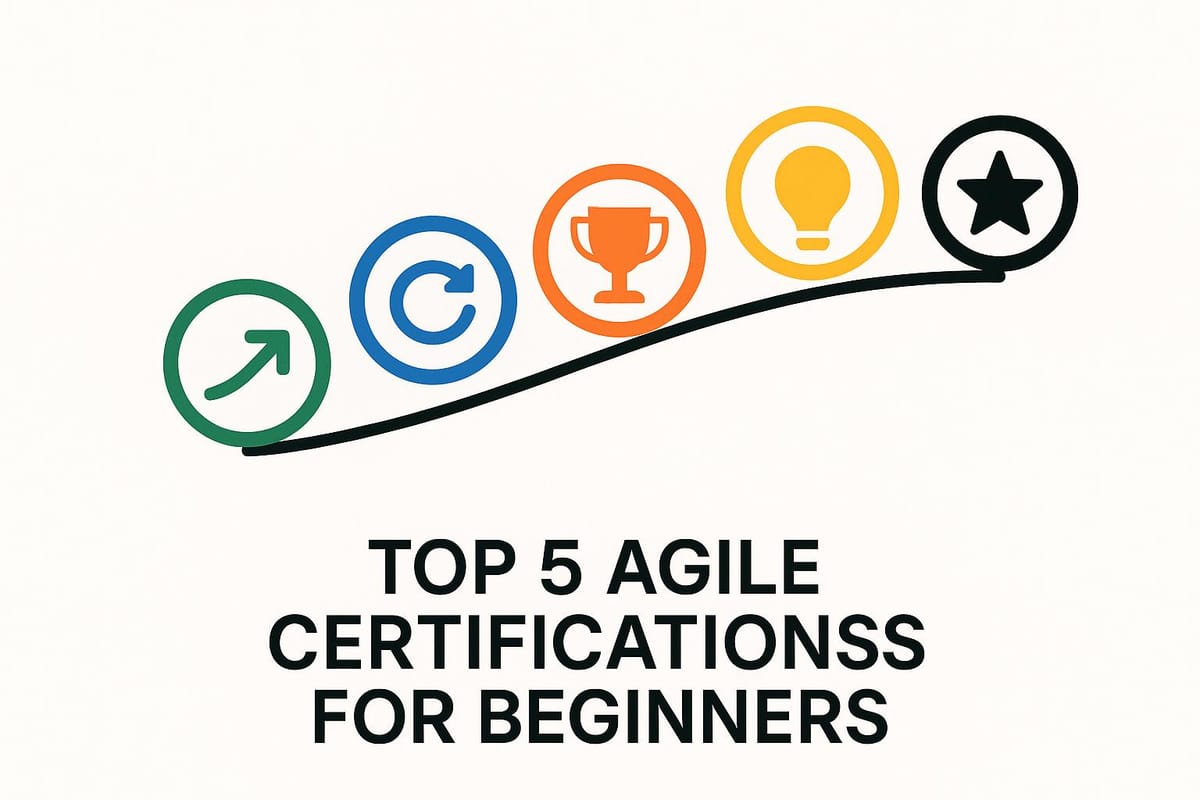
If you're new to Agile and want to kickstart your career in project management, certifications can help you gain the skills employers look for. Here’s a quick guide to five beginner-friendly Agile certifications:
- Certified ScrumMaster (CSM): Great for learning Scrum basics; requires a 2-day course and costs $1,200–$1,500. Valid for 2 years.
- Professional Scrum Master I (PSM I): A budget-friendly option at $150 per exam, with no prerequisites. Lifetime validity.
- AgilePM Foundation: Focuses on Agile project management principles. Costs $400–$800, no prerequisites.
- ICAgile Certified Professional (ICP): Offers broad Agile knowledge. Requires accredited training, costs $1,000–$2,000. No exam.
- Disciplined Agile Scrum Master (DASM): Combines Agile and Lean practices. Costs $399–$1,550, includes training. Requires annual renewal.
Quick Comparison:
| Certification | Cost (USD) | Prerequisites | Validity | Focus Area |
|---|---|---|---|---|
| CSM | $1,200–$1,500 | 2-day course | 2 years | Scrum basics |
| PSM I | $150 | None | Lifetime | Scrum expertise |
| AgilePM Foundation | $400–$800 | None | Lifetime | Agile project management |
| ICP | $1,000–$2,000 | Accredited training | Lifetime | Broad Agile knowledge |
| DASM | $399–$1,550 | None | Annual renewal | Agile & Lean practices |
Choosing the right certification depends on your career goals, budget, and learning style. For cost-effective options, consider PSM I. If you prefer structured learning, CSM or DASM might suit you better.
Agile Certifications: A Beginner's Guide to Boosting Your Career
How to Choose Beginner-Friendly Agile Certifications
If you're new to Agile, finding the right certification can feel overwhelming. To make the process easier, here are some key factors to consider when selecting a certification that suits beginners. The best entry-level Agile certifications share certain traits that make them approachable and valuable for those just starting out.
Minimal Prerequisites are essential for newcomers. Look for certifications that don’t demand years of Agile experience or a background in advanced project management. Some certifications are designed specifically for beginners, requiring little to no prior exposure to Agile practices. While a few may ask for minimal project experience, many are open to anyone eager to learn.
Cost considerations are another important factor. Entry-level certifications can cost anywhere from $150 to $1,500. Be sure to account for additional expenses like prep courses, study materials, or even retake fees if you don’t pass on your first attempt. Sometimes, a slightly pricier certification with robust training materials ends up being more economical than a cheaper one that requires extra resources later.
Industry recognition matters when it comes to how employers perceive your certification. Research which certifications are most sought after in your target industry and region. For example, tech companies may favor certain credentials, while industries like manufacturing or healthcare might prefer others. Scanning local job listings can help you identify which certifications are in demand where you live.
Learning format flexibility is crucial, especially if you have a busy schedule. Some certifications require multi-day, in-person training sessions, while others offer self-paced online options. Think about your learning style, time availability, and budget when deciding which format works best for you.
Exam difficulty and pass rates are worth considering. Beginner certifications often have pass rates between 85% and 95% for first-time test takers who follow the recommended preparation. Focus on certifications that emphasize foundational Agile concepts rather than advanced theories or heavy memorization.
Continuing education requirements can vary widely. Some certifications require annual renewal fees or ongoing education credits, while others remain valid indefinitely. Be sure to factor these long-term commitments into your career and budget planning.
Hands-on skill development is a key feature of valuable certifications. The best beginner credentials focus on practical skills you can apply immediately, such as running daily standups, managing product backlogs, or facilitating sprint retrospectives.
When we evaluated the certifications in our top five list, these criteria guided our recommendations to ensure each option delivers real value for beginners. By prioritizing these factors, you can confidently choose a certification that sets you up for success in Agile practices.
1. Certified ScrumMaster (CSM) – Scrum Alliance
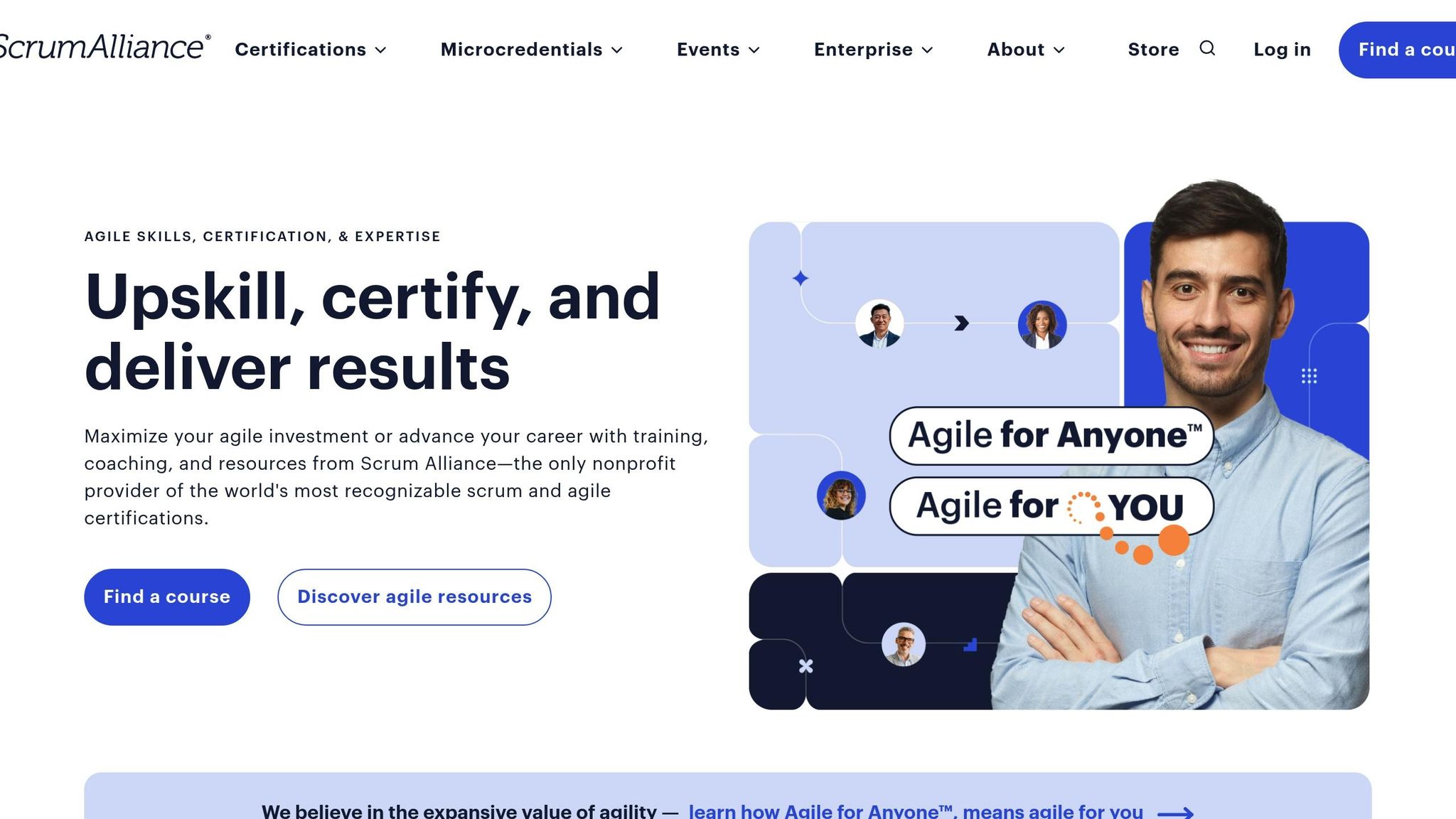
The Certified ScrumMaster (CSM) certification from Scrum Alliance is an entry-level credential aimed at helping beginners grasp the fundamental concepts of Scrum. Here’s what you need to know to get started.
Prerequisites
To earn the CSM certification, you’ll need to complete a two-day training course conducted by a Certified Scrum Trainer (CST). While there aren’t strict eligibility requirements, having a basic understanding of Scrum principles and team roles is highly recommended. Once you finish the course, you’ll gain access to the online CSM exam.
2. Professional Scrum Master I (PSM I) – Scrum.org
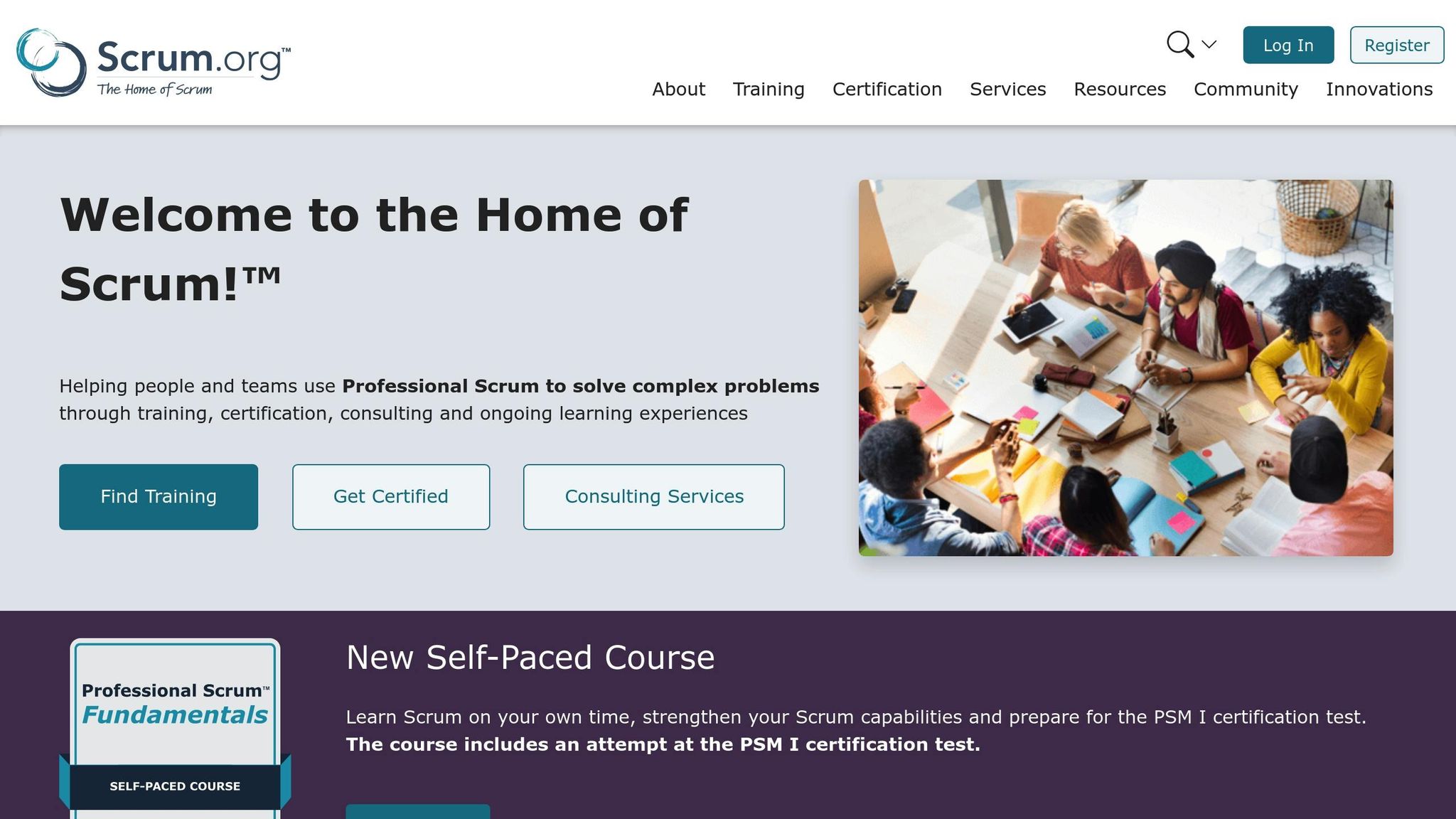
The Professional Scrum Master I (PSM I) certification from Scrum.org serves as a solid starting point for those venturing into Agile project management. Unlike certifications handed out for merely attending a course, the PSM I emphasizes your actual understanding and application of Scrum principles.
Prerequisites
There are no strict prerequisites for taking the PSM I certification exam. You don’t need prior certifications, specific work experience, or mandatory training to qualify. However, a basic understanding of Scrum principles is essential. Scrum.org suggests either an instructor-led or self-paced Professional Scrum Master course to help you prepare for the exam.
Cost (USD)
The exam costs $200 per attempt. If you don’t pass on your first try, retakes are also priced at $200. Since the certification is valid for a lifetime and doesn’t require annual renewals, it offers a cost-effective long-term option. Additionally, the test password does not expire. Some training providers bundle a free exam attempt with their courses, which typically cost between $1,200 and $1,400.
Exam Format
The PSM I exam consists of 80 questions in multiple formats, such as multiple choice, multiple answer, and true/false. You’ll need to complete the test within 60 minutes and achieve a passing score of 85%. The exam is available in English, Japanese, and Simplified Chinese (via scrum.org.cn). This rigorous format ensures that you’re not just memorizing concepts but genuinely grasping Scrum principles, further enhancing the certification's credibility.
Industry Recognition
The PSM I certification is acknowledged worldwide and highly regarded across various industries. Its rigorous assessment process makes it a trusted measure of Scrum expertise, reinforcing its value among organizations looking for skilled professionals.
Career Benefits
Earning the PSM I certification can pave the way for Scrum Master roles and demonstrate your dedication to Agile practices. It validates your ability to lead Scrum events, guide teams, and address obstacles - skills that are increasingly sought after in sectors like technology, finance, and healthcare, where Agile methodologies are gaining traction.
3. AgilePM Foundation – APMG International
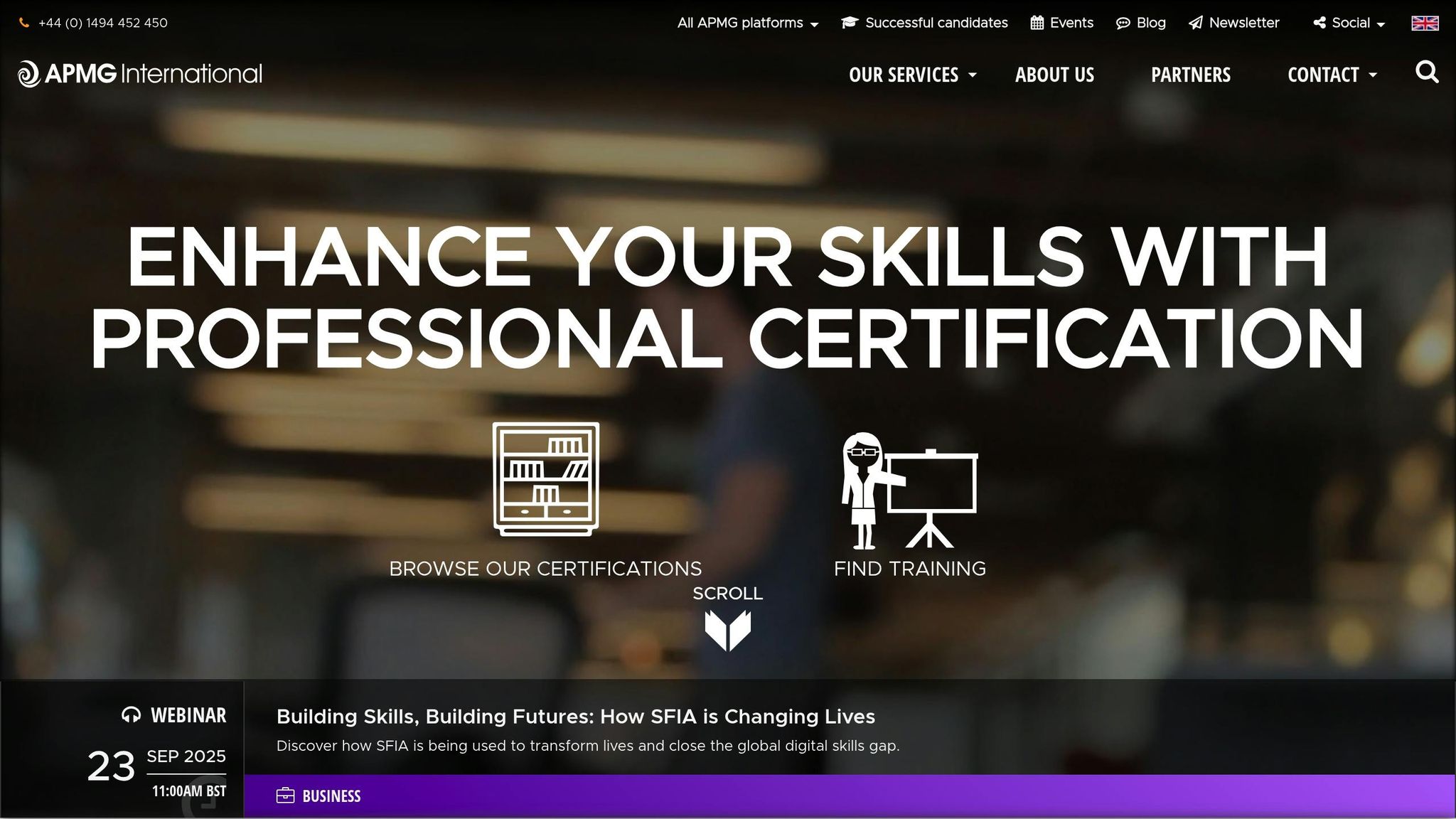
The AgilePM Foundation certification from APMG International provides a straightforward way for beginners to step into the world of project management. With minimal barriers to entry, it’s a great starting point for those looking to build foundational skills.
Prerequisites
You don’t need to meet any formal prerequisites to pursue the AgilePM Foundation certification. However, candidates should be at least 19 years old and possess basic proficiency in English and ICT (Information and Communication Technology). While not mandatory, some training providers suggest having prior experience with project work or completing an introductory project management course beforehand.
4. ICAgile Certified Professional (ICP) – ICAgile
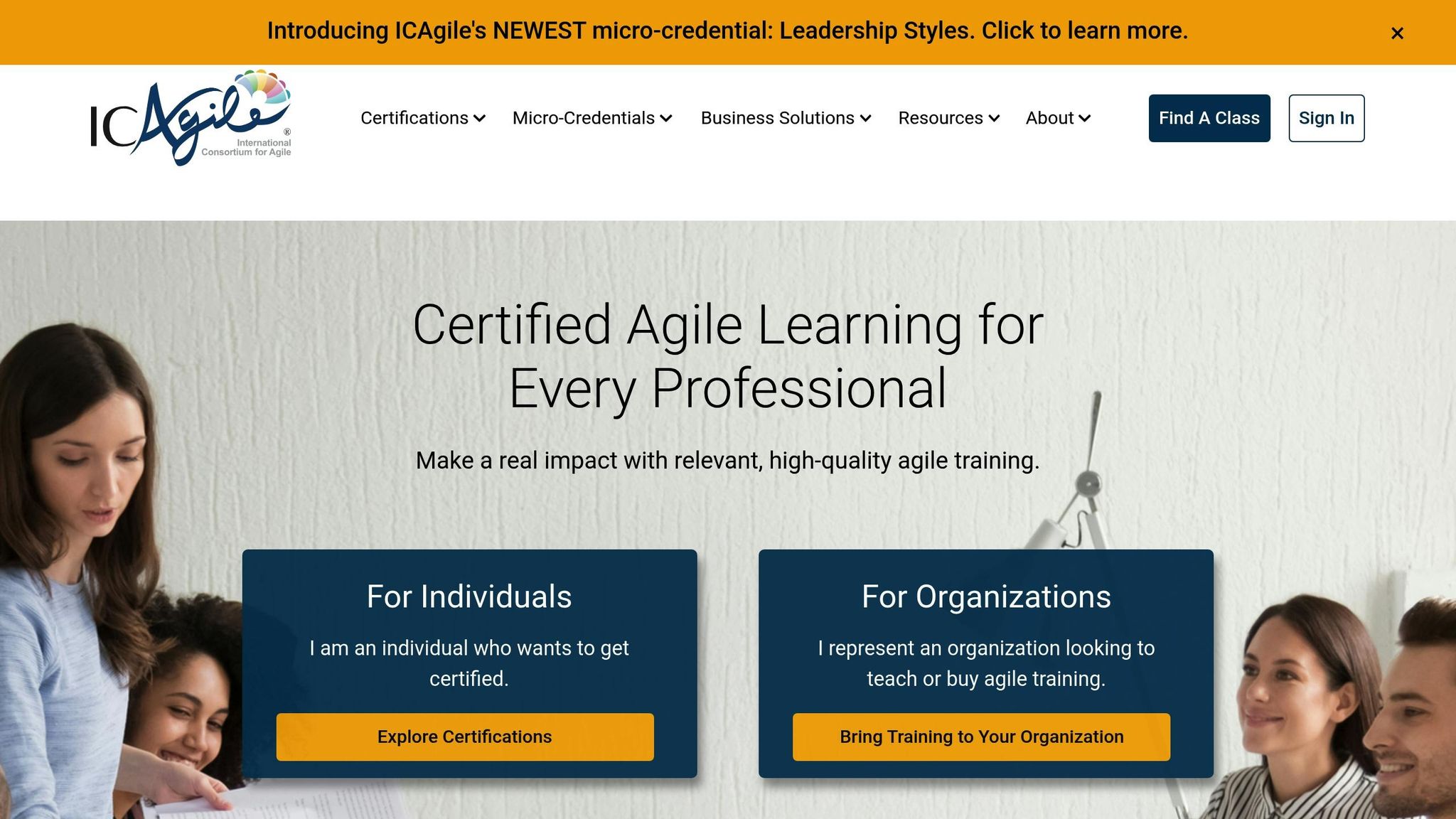
The ICAgile Certified Professional (ICP) certification is an ideal starting point for anyone looking to dive into agile methodologies. For foundational courses like ICAgile Agile Fundamentals, there are no prerequisites, reflecting ICAgile's inclusive approach.
However, individual ICAgile-accredited training providers might have their own requirements. For instance, advanced programs like ICP-ACC (Agile Coaching) may ask for at least six months of agile experience or a foundational certification. This flexible framework allows beginners to select a learning path that aligns with their current experience and goals.
5. Disciplined Agile Scrum Master (DASM) – Project Management Institute (PMI)
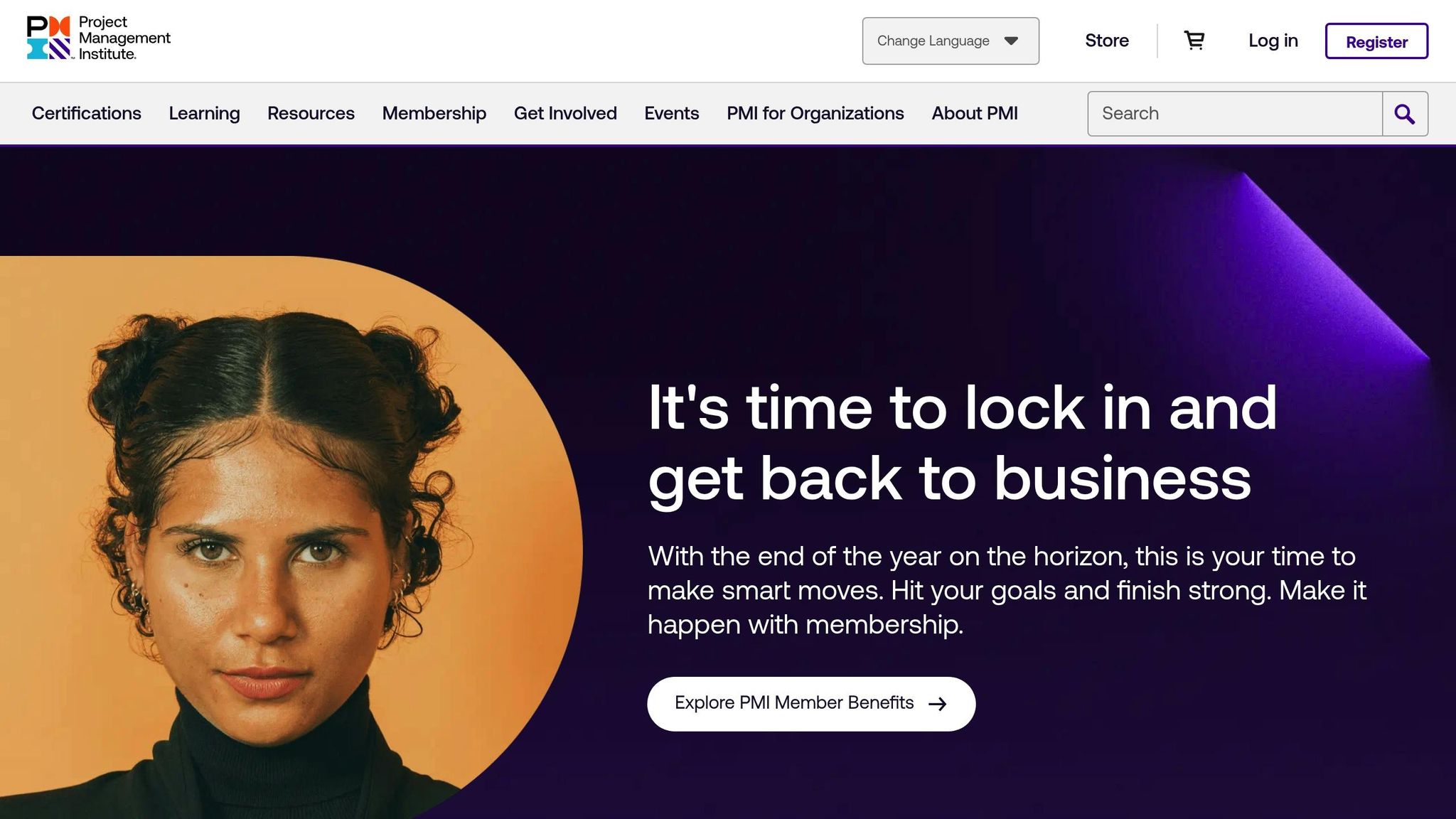
The Disciplined Agile Scrum Master (DASM) certification from PMI blends Scrum practices with lean methodologies, offering a comprehensive introduction to agile principles through the Disciplined Agile toolkit. Instead of focusing solely on a single agile framework, this certification equips you with a versatile understanding of various agile and lean approaches, enabling you to tailor your methods to different scenarios. Below, you'll find details about prerequisites, costs, and exam specifics to help you decide if this certification is right for you.
Prerequisites
The best part? There are no prerequisites for the DASM certification, making it a great starting point for beginners. It's designed to introduce newcomers to the basics of agile and lean methodologies, ensuring you can dive right in without prior experience.
Cost (USD)
The pricing for DASM certification varies depending on your PMI membership status and training provider. Here’s a breakdown:
- PMI Members: $399 for the two-day online course, including one exam attempt.
- Non-members: $499 for the same course and exam.
If you opt for a PMI Authorized Training Partner, costs range from $677 to $1,550, with occasional discounts available. Retail pricing often hovers around $995, but PMI chapter members may enjoy reduced rates, while non-members could pay up to $1,195 plus tax. Flash sales sometimes offer savings of up to $200, and additional discounts may apply for military personnel, students, or PMI chapter members.
Other fees to keep in mind include:
- Retake Fee: $150 for subsequent exam attempts.
- Renewal Fee: $50 annually, requiring 7 hours of professional development (with at least 5 hours focused on Disciplined Agile).
Exam Format
The DASM exam is straightforward, consisting of 50 questions delivered online in a non-proctored format. You’ll need to complete the exam within 30 days of finishing your training course. You’re allowed up to three attempts to pass. However, if you don’t succeed after the third try, you’ll need to retake the entire training course.
Industry Recognition
PMI’s standing as a global leader in project management adds credibility to the DASM certification. Earning this certification also provides 14 Professional Development Units (PDUs), which can be applied toward maintaining other PMI credentials. Additionally, you’ll gain access to the "Choose Your WoW!" book, a key resource for both the course and exam. If you’re a PMI member, you can download this book at no extra cost.
Career Benefits
DASM goes beyond Scrum by offering a robust toolkit that includes agile and lean fundamentals, along with the Disciplined Agile framework. This flexibility allows you to adapt your approach to match your organization’s unique needs. The certification’s 14-hour live instructor-led training ensures you receive personalized guidance and the chance to engage with experienced professionals. Upon completion, you’ll earn a certificate that not only fulfills the education requirement for DASM but also highlights your dedication to advancing your skills in agile methodologies.
Certification Comparison Table
Compare these five Agile certifications side by side to find the one that aligns with your career goals, budget, and preferred learning style.
| Certification | Prerequisites | Cost Range (USD) | Exam Format | Industry Recognition | Key Career Benefits |
|---|---|---|---|---|---|
| Certified ScrumMaster (CSM) | Completion of a CSM course led by a Certified Scrum Trainer; basic Scrum knowledge is helpful. | $1,200–$1,500 (includes training) | Online; approx. 50 questions in 60 minutes | High – globally recognized by Scrum Alliance | Builds a strong Scrum foundation, offers networking opportunities; valid for 2 years |
| Professional Scrum Master I (PSM I) | No formal prerequisites; familiarity with the Scrum Guide and practical experience recommended. | $150 (exam only) | Online; approx. 80 questions in 60 minutes | High – strong credibility with Scrum.org | Cost-effective; lifetime validity; ideal for self-paced learners |
| AgilePM Foundation | No prerequisites at the Foundation level. | $400–$800 (with training) | Online or paper; around 75 questions in 40 minutes | Moderate – backed by APMG International | Provides a structured project management approach; recognized in some government sectors |
| ICAgile Certified Professional (ICP) | Completion of an ICAgile-accredited course; no prior experience required for Agile Fundamentals. | $1,000–$2,000 (includes training) | No exam – competency-based assessment | Growing – supported by the ICAgile consortium | Covers broad agile knowledge with multiple specialization paths |
| Disciplined Agile Scrum Master (DASM) | No formal prerequisites; basic understanding of Agile and Scrum principles is helpful. | $399–$1,550 (includes training) | Online; approx. 50 questions in a non-proctored setting | High – recognized by PMI | Offers a versatile agile toolkit; requires annual renewal |
Choosing the Right Certification
Budget considerations: If you're looking for an affordable option, PSM I stands out at just $150, making it a cost-effective choice for self-directed learners. On the other hand, ICP offers extensive training but can cost as much as $2,000. Certifications like CSM and DASM include mandatory training, with CSM requiring renewal every two years and DASM needing annual renewals. In contrast, PSM I is a one-time investment with lifetime validity.
Career focus: If you're aiming for Scrum-specific roles, CSM or PSM I are the top picks. For a broader understanding of Agile, DASM provides a flexible toolkit, while AgilePM Foundation is tailored for those combining traditional project management with Agile practices. ICP is perfect for those seeking a comprehensive Agile education without the stress of an exam. Additionally, visual learners may prefer instructor-led programs like CSM, DASM, or ICP, while independent learners might gravitate toward the flexibility of PSM I.
Conclusion
Getting started with Agile doesn’t have to be complicated. These five certifications offer a clear path to building expertise, whether your focus is on Scrum or a broader Agile framework.
The PSM I stands out as a budget-friendly option for learners mindful of costs, while the CSM combines structured learning with valuable networking opportunities. For those new to Agile, the ICP provides a beginner-friendly, competency-based approach. The DASM equips you with a flexible toolkit to navigate various Agile practices, and the AgilePM Foundation seamlessly blends traditional project management principles with Agile methodologies.
When selecting a certification, think about your career goals, preferred learning style, and budget. Pairing your certification with hands-on training can make a big difference in mastering Agile practices.
For practical experience, platforms like Upskillist offer interactive training options. Their Agile Project Management Course Online is priced at $39.99 per month and includes a 7-day free trial. This course, rated 4.9 out of 5 by users, has been praised for its affordability, flexibility, and clear, well-structured lessons that cover a variety of topics.
Combining certifications with targeted, hands-on training lays a strong foundation for success in Agile. Whether you’re transitioning from traditional project management or stepping into the tech world for the first time, these credentials and skills can help you thrive in today’s Agile-focused workplace.
FAQs
What should I consider when selecting an Agile certification as a beginner?
When diving into Agile certifications, start by considering your career aspirations, budget, and the Agile framework that aligns with your interests, such as Scrum or Kanban. For those new to Agile, certifications like the ICAgile Certified Professional (ICP) provide a solid understanding of core Agile principles. If you're targeting a role focused on Scrum, the Certified ScrumMaster (CSM) might be the better fit.
Take time to weigh factors like cost, time investment, and how well the certification is recognized in your industry. Picking the right certification can lay a strong groundwork for your Agile career and help you move toward your goals with greater clarity and purpose.
What are the career benefits of beginner-friendly Agile certifications, and how are they recognized in the industry?
Beginner-friendly Agile certifications like Certified ScrumMaster (CSM), PMI Agile Certified Practitioner (PMI-ACP), and SAFe Agilist are widely recognized across various industries. These certifications highlight a solid understanding of Agile principles and methods, making them valuable for professionals aiming to grow in fields like project management, software development, or other Agile-focused roles.
Achieving these certifications can open doors to better job opportunities, competitive salaries, and greater professional credibility. Employers often value certifications from established organizations such as Scrum Alliance and PMI, helping candidates stand out in interviews and qualify for leadership or specialized positions. With Agile's growing adoption across industries, these certifications are becoming a key asset for career advancement.
What are the long-term costs and commitments for maintaining Agile certifications?
Maintaining Agile certifications comes with recurring renewal fees, typically ranging from $100 to $555 every 1–2 years, depending on the certification type. On top of that, many certifications require you to complete professional development or continuing education to keep them valid. This often means dedicating additional time and money.
These factors are worth factoring in when evaluating the long-term value and upkeep of your Agile credentials.

